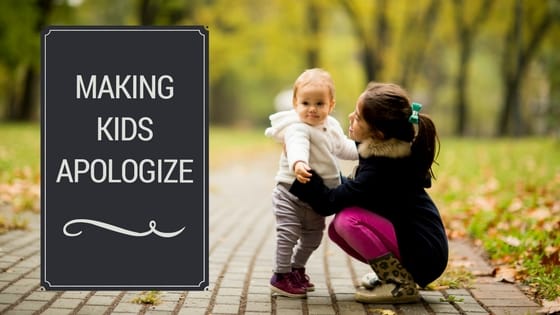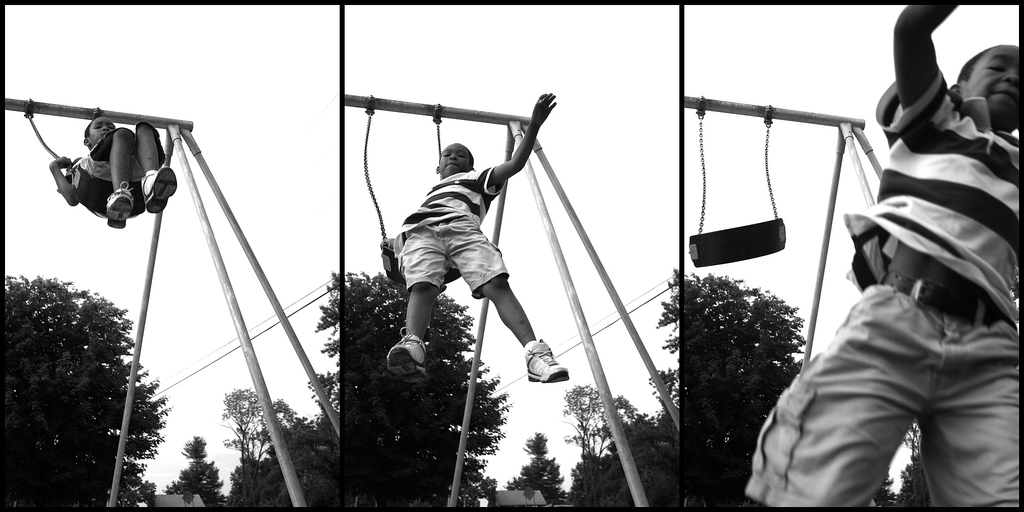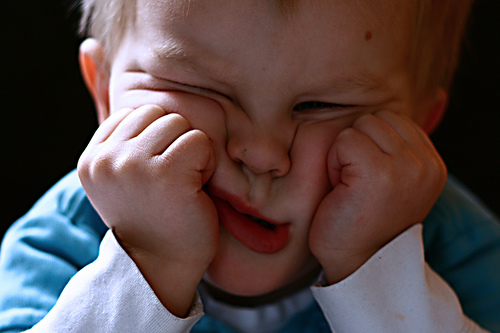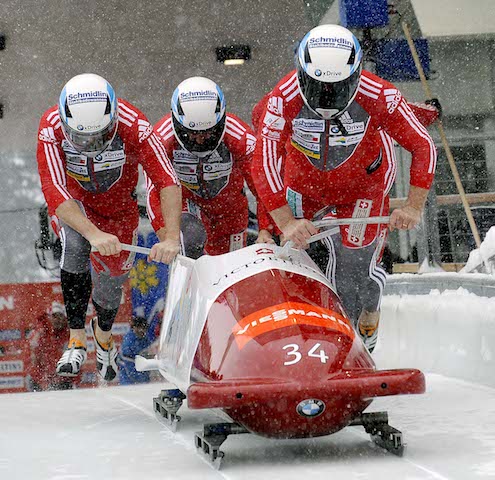As a parent, what do you want your kids to do after they fight?
Most of us want them to reconnect with each other and apologize, right?
But…
What if they don’t want to apologize?
Do you make them say “sorry” even if they don’t mean it?
If they still feel mad, do you let them wait until they’re ready? What if they’re never ready?
What if you have a kid who is extra sensitive, stubborn, spirited, or distracted?
When I was a kid and fought with my siblings, my mom didn’t make us apologize to each other. She said that, “forcing kids to apologize is teaching them to lie”.
Her approach might go against conventional wisdom–but I’ve always agreed with my mom on this one and so do many other parenting experts.
Alfie Kohn says that if kids feel sorry, they usually apologize on their own, especially if you’ve modeled this already.
And if kids don’t feel regretful about fighting or hitting? Then, you have a valuable “teaching opportunity”.
There are a bunch of things we can do to teach kids to reconnect; techniques that also build their social and emotional skills, and strengthen family relationships.
Here are six simple steps to follow with your kids to help them reconnect after a fight.
The best part? These steps aren’t about forcing your kids to apologize, or passively waiting for them to “be ready”. They work for children of all ages and for “out-of-the-box” kids too! For those extra sensitive, stubborn, spirited, or distracted kiddo’s, you just may need to adjust your language.
I’ve even included mini-scripts for you to use in each step to take the guesswork out of what to say!
Let’s go through a common scenario so you can see how to teach kids conflict resolution skills…
Solving a Sibling Squabble: What to do when kids start fighting over a toy
Missy is playing with a truck, and Max is next to her building with blocks. Missy leaves the truck on the ground and runs away for a moment. When she gets back, Max is playing with the truck. Missy screams and grabs the truck away from him. Max hits her, and Missy hits him back.
Six Simple Steps to Help Kids Resolve Conflict
1. Help Both Kids Calm Down
Before you help kids reconnect, it’s important that they are both ready. If kids are upset, it’s probably too hard for them to have a conversation and consider the other person’s perspective. If kids are fighting over a toy, you can de-escalate the situation by gently placing your hands on the toy, so neither child can play with it.
Script: Say, “I’m just going to keep my hands here [on this toy] until we can figure out how to solve this.” or “You are both sad. This didn’t go the way you wanted. I have an arm to hug each of you.”
This is also a good time to use a Calming Plan.
2. Connect Before You Correct
Before you correct their behavior (the grabbing and hitting), you’ll need to connect with both children. Giving empathy to each of them will help everyone feel connected and help them calm down.
Script: You can say, “Max, you look mad. You were playing with the truck and Missy took it away from you.” To Missy, you say, “You’re mad too. You were not done with the truck when Max started to play with it.”
3. Understand the Communication Beneath the Behavior
Max and Missy both hit each other to “say” something. It’s likely that both kids were overcome by upset and sadness, and they hit because they didn’t know how to communicate to the other child that they wanted the truck. When we know that behavior is communication, then we can understand “why” each child acted the way he or she did.
Script: To Max, “When you hit Missy, were you trying to tell her that you didn’t want her to take the truck?” To Missy, “When you hit Max were you trying to tell him that you didn’t want to be hit and you were still playing with the truck?”
4. Help Kids Understand Each Other
Now that both kids are calm and connected, they can begin to understand the other child’s perspective. Finding common ground is helpful–no one likes to get hit, and no one likes it when someone else grabs their toys.
Script: Say, “Oh that makes sense to me. You both didn’t want to get hit and you both wanted to play with the truck. You ran out of words, so you hit.”
5. Find a Solution that Works for Everyone
Both kids can offer their solutions. If they don’t have any ideas, you can offer your own solutions. Keep offering ideas until… a.) you find something that works for everyone (including you) OR b.) you run out of ideas.
Script: Say, “What ideas do you have to solve this?” If they don’t have any ideas, say, “Is it okay if Max gives the truck to Missy after he’s done?” “Or does it work for Missy to give the truck to Max after she’s done?”
If they can’t agree on a solution, say, “Sounds like we’re stuck. Come back to me when you’ve got a solution that you both like. I’m going to hold onto the truck until then.” And you can put the truck in an inaccessible area, like a high shelf.
6. Smile
Ok, you don’t have to smile, but it sure makes things easier. We know from Positive Psychology that even a forced smile helps calm and relax the body.
When you smile, you bring lightness and ease to the moment. If you are an “over-thinker” like I am, smiling can help you take life a little less seriously.
Smile because you are doing something that will help your kids to build their social-emotional skills. Smile because this could be the most important thing you do all day.
Final Thoughts
Using these six steps, kids can reconnect without blame, shame, or forced apologies. They can come up with a solution that works for them (and you), while developing collaboration and peaceful problem-solving skills.
In the end, the kids are able to understand each other's perspectives, build their social-emotional skills, and strengthen their relationship.
If you read through these steps and thought, “This would never work with my kids” then I’d love to hear from you in the comments section at the bottom.
Tell me – what happens when you try to help your kids reconnect? Which one of these steps doesn’t work with your kids? I’ll do my best to write a helpful follow-up about your situation.
If these steps DO work for you, let me know your experience too! There is nothing better than hearing from readers who have used our tips and scripts to tackle their parenting challenges.










This is great and super insightful. Quick question though.. How would the scripts go if you don’t know what happened. I.e. you’re in the kitchen making dinner and suddenly they are fighting and both disagree on how any of it started. Or you can’t even get an insight into what happened because they are both so intent on hitting each other?
Great question. If the kids are hitting each other, I get my body between them. Then I can say, “Looks like you are both mad and sad.” “What are your hands trying to say?” When they respond I empathize with both kids, “Oh, you didn’t like it when your sibling did xyz.” Then shift to problem solving.
Thanks for bringing this up, Mamabear! Yes, with tweens and teens this will look different. It happens quickly and unless they are physically hurting themselves or damaging objects I often don’t intervene in the moment. I save these steps for hours later and I often speak to each of the kids privately, giving them lots of empathy first before asking them to consider a solution or their sibling’s perspective. Only then do I bring them together to talk to each other and do step 5.
With tweens and teens you can also ask them outside the moment, “When you are fighting what can I do that would be helpful? Is there anything I can do to stop it from escalating? Is there anything that you DON’T want me to do?” Get their feedback.
I hear you. Yes, sometimes that happens too. If holding the toy makes things escalate then I use empathy and talk about their feelings, “Oh you are so sad and mad. You want to play with this. You don’t want my hands on this.” With time, in my experience, the kids will eventually calm down.
When my kids were young, this kind of thing came naturally and felt so wholesome. It just feels different and much harder to be magnanimous when rather than a toy truck between little kids, your teen and tween daughters are cussing each other out because one took the blow dryer in her room and the other one can’t find it, for example. Or when they’re fighting over who gets to use the microwave first for a make-your-own dinner night. Or when one has insulted the other’s outfit they were planning to wear to school. The fights are so fast and furious that even if I had the stamina, it would be unrealistic to enact these steps because how do you separate two kids that are refusing to go to their rooms, are completely convinced they’re in the right, and have to eat, or get in the car for school? Maybe you just have to accept that at certain times of family life, the kids aren’t going to be getting along and there’s little to be done besides try to keep your own cool and insist on house rules (like no swearing and no hitting).
Thank you for including scripts!! I think they are super helpful.
Elizabeth, I’m glad they are useful! Thanks for letting me know.
I have the same problem with my children. Charlie is only 18 months and I noticed that he has started pushing children away when someone is in his way or take the toy he is playing with. I take him away from the situation when this happens in the playgroup and say ‘No’ to him but of course this doesn’t make any difference to his behaviour. Should I just use the language you used in the examples on how to solve the conflict?
You might try having conversations with them individually. Say, “I’m noticing that when you say ___ to your sister, that you usually don’t get what you want. Do you want some ideas about how to talk to her so she can hear you better?” And then coach her about what she can say.
What if we have the same situation, but one of the children is just a toddler? My little son is just 1y and 6 m and does not seem to understand what I am trying to explain to him and his 3 year old brother.
With younger children you can be a translator. E.g. if the 3 year old grabs the toy from the baby and the baby starts crying I would say to the 3 year old, “Oh look, he’s crying. That’s his way of saying I didn’t like that. I want my toy back. What are you going to do?” Then see if the 3 year old can come up with a solution–with your help–that also works for the baby. Hope that helps!
Thank you! I think that will work for my 3 year old, I am going to do that! Unfortunately, the problem is on both sides. The little one is also grabbing toys from the 3 year old, especially when he is not looking 😞 When the 3 year old realises the toy was stollen, they both start screaming at each other. I don’t know how to help them.
Because of their ages, you’ll probably have to be the voice for both of them. Coach them through their emotions and help them find the words to talk to each other…. To the 3 year old say, “You aren’t done with your toy. You’re angry. You didn’t want him to take it….” etc. Hope that helps.
This makes lots of sense: no one is ‘made wrong,’ and each child feels heard and understood. And each realizes that the outcome they want isn’t possible without effort toward a solution / compromise. Thanks,
Thanks, Anna!
What if it is one sided? One kid is hitting and slapping and the other is asking him to stop and he doesn’t? I agree with not forcing apologies.
Great question, we’re talking about this in our next blog post! Stay tuned!